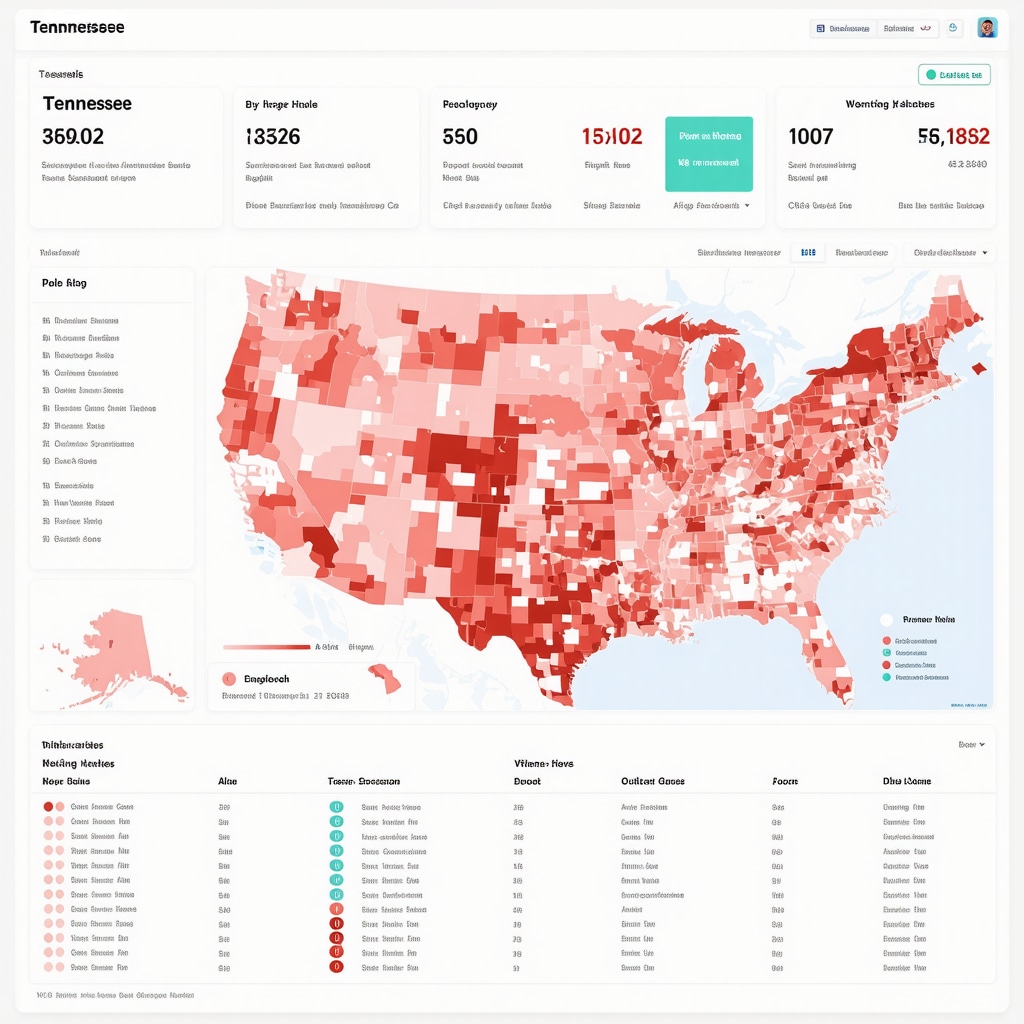Unlocking the Tennessee Mortgage Puzzle: Fixed or Adjustable?
In Tennessee’s dynamic housing market, selecting between fixed and adjustable mortgage rates can profoundly influence your financial journey. With interest rates fluctuating and economic factors shaping lending landscapes, understanding these mortgage types isn’t just beneficial—it’s essential. Whether you’re a first-time buyer in Nashville or looking to refinance in Memphis, the decision between the stability of fixed rates and the flexibility of adjustable rates demands an expert lens that factors in your unique circumstances and Tennessee’s market nuances.
The Steadfast Stability of Fixed Mortgage Rates
Fixed-rate mortgages offer predictability—a constant interest rate and monthly payment throughout the loan term, often spanning 15 to 30 years. This consistency makes budgeting straightforward, especially appealing in Tennessee’s varied economic climate where inflation and housing demand can drive market shifts. For example, a homeowner locking in a 30-year fixed rate in Knoxville today secures protection against future rate increases, providing peace of mind amid uncertain market conditions.
Adjustable-Rate Mortgages: Flexibility with a Tennessee Twist
Adjustable-rate mortgages (ARMs) start with lower initial rates that adjust periodically based on market indices. This can translate into significant savings in the short term, ideal for Tennessee buyers planning to move or refinance within a few years. However, the risk lies in potential rate hikes, which could escalate monthly payments unexpectedly. Consider a Memphis investor opting for a 5/1 ARM who benefits from low initial payments but must prepare for adjustments after five years, reflecting market volatility tied to regional economic trends.
How Do Tennessee Market Trends Influence Your Mortgage Choice?
Regional economic factors such as employment growth, real estate demand, and Federal Reserve policy shifts uniquely impact Tennessee mortgage rates. A surge in local housing demand can push adjustable rates upward, making fixed rates more attractive despite their initially higher cost. Conversely, when market indicators forecast rate declines or stability, ARMs might offer cost-effective advantages. Homebuyers should closely monitor trends, leveraging resources like this expert guide on navigating fixed vs adjustable mortgage rates in Tennessee for timely insights.
Real-World Tennessee Scenarios: Choosing What Fits You Best
Imagine Sarah, a young professional in Nashville, who plans to stay in her home long-term and prefers financial certainty; she opts for a 30-year fixed mortgage, locking in today’s rates. Meanwhile, Tom, a Memphis entrepreneur, anticipates relocating within 5 years and chooses a 5/1 ARM to benefit from lower initial payments, accepting future variability. These scenarios underline that the “best” mortgage is deeply personal, contingent on your timeline, risk tolerance, and financial goals within Tennessee’s diverse communities.
Expert Tip: Align Your Mortgage with Your Tennessee Financial Landscape
Beyond the rate type, factors like credit scores, down payment size, and lender terms influence mortgage costs. Tennessee buyers can capitalize on tailored advice by consulting local mortgage professionals who understand regional market intricacies. Reading about how credit scores impact Tennessee mortgage interest rates can deepen your preparedness.
Curious to learn more about securing the ideal mortgage rate for your Tennessee home? Share your questions or experiences in the comments below, or explore our comprehensive resources to empower your home financing journey.
For authoritative insights on mortgage rate behaviors and economic factors, the Federal Reserve’s monetary policy updates provide invaluable context shaping both fixed and adjustable mortgage rates nationwide, including Tennessee.
Understanding the Frequency and Impact of Tennessee Mortgage Rate Fluctuations
Mortgage rates in Tennessee do not remain static; they shift in response to a complex interplay of economic indicators, lender policies, and market demand. Typically, rates can change daily, influenced by factors such as the Federal Reserve’s monetary policy, inflation expectations, and local housing market trends. For instance, a sudden increase in employment rates across Tennessee cities like Knoxville or Chattanooga can generate higher demand for mortgages, potentially nudging rates upward.
Homebuyers and refinancers alike must stay informed about these frequent changes to optimize loan costs. According to the Federal Reserve’s policy updates, shifts in benchmark interest rates often lead to immediate reactions in mortgage pricing. Recognizing this dynamic can empower Tennessee residents to strategically time their mortgage applications or refinancing decisions.
When Should Tennessee Homebuyers Lock in Their Mortgage Rates?
Locking a mortgage rate is a critical decision that can save or cost thousands over the life of a loan. In Tennessee’s fluctuating market, expert lenders often recommend locking rates when indicators suggest impending increases or during periods of relative stability. Conversely, if forecasts predict rate drops, waiting may be advantageous—though it carries risk.
For example, a buyer in Nashville observing rising inflation and Federal Reserve tightening might elect to lock a fixed rate promptly to protect against hikes. In contrast, a homeowner considering refinancing in Memphis might monitor rates closely before locking, leveraging resources like this guide on Tennessee refinance rate timing for data-driven decisions.
How Can Tennessee Buyers Balance Rate Lock Timing with Market Volatility?
Timing a mortgage rate lock requires blending market insight with personal financial readiness. Buyers must evaluate their risk tolerance, loan type, and expected closing timeline. Adjustable-rate mortgage applicants, for instance, may prioritize locking during low-rate windows to maximize initial savings, while fixed-rate borrowers may lock immediately to secure long-term stability.
Engaging with experienced local mortgage brokers, such as those featured in this Tennessee mortgage broker guide, can provide personalized advice grounded in real-time market conditions. These experts also help navigate lender-specific lock policies and fees, which can vary significantly.
Have you recently locked a mortgage rate in Tennessee? Share your strategies or questions below to help fellow homebuyers make informed decisions.
Decoding the Complex Dance: Tennessee Mortgage Rate Locks Amid Economic Volatility
Locking a mortgage rate in Tennessee is not merely a transactional step but a strategic move that requires nuanced understanding of both macroeconomic forces and local market idiosyncrasies. The decision to lock or float hinges on interpreting signals like Federal Reserve announcements, inflation data, and regional housing supply-demand dynamics. For instance, a sudden uptick in Tennessee’s job market growth may signal increased mortgage demand, nudging rates upward, whereas a dip in consumer confidence might temporarily suppress borrowing costs.
Mortgage professionals frequently advise balancing external economic forecasts with personal financial circumstances. This includes assessing your loan’s closing timeline and risk tolerance against expected market shifts. For example, a borrower in Chattanooga anticipating a closing in 45 days must weigh the risk of rate hikes against the cost of locking prematurely.
How Do Macro-Economic Indicators Specifically Affect Tennessee Mortgage Rate Lock Decisions?
Macro indicators such as the Consumer Price Index (CPI), unemployment rates, and Federal Open Market Committee (FOMC) statements provide critical insight into interest rate trajectories. The Federal Reserve’s monetary policy, detailed extensively in official Federal Reserve releases, directly influences the cost of capital, which cascades down to mortgage pricing. For Tennessee borrowers, this means that a hawkish Fed stance often accelerates the urgency to lock rates, while dovish signals may justify waiting.
Moreover, regional data like Tennessee’s housing starts and permits, published by local government agencies, offer granular foresight into market liquidity and competition, further influencing rate lock timing strategies.
Leveraging Sophisticated Tools and Expert Networks for Optimal Rate Lock Timing in Tennessee
Today’s homebuyers and refinancers benefit immensely from advanced analytics platforms that aggregate real-time market data, enabling more precise rate lock timing. These tools, combined with expert advice from seasoned Tennessee mortgage brokers, help decode lender-specific lock policies, expiration terms, and associated fees that can significantly affect overall loan costs.
Engaging professionals familiar with Tennessee’s lending landscape, such as those highlighted in this guide to top local mortgage brokers, can provide personalized strategies aligning market trends with your financial goals. These experts also facilitate navigating complex scenarios like rate lock extensions or float-down options, which can be pivotal in volatile markets.
Ready to master the art of mortgage rate locking in Tennessee? Connect with our network of expert brokers or explore our in-depth resources to tailor your strategy effectively.

Deciphering Tennessee’s Mortgage Rate Lock Nuances in a Volatile Economy
Amid the intricate interplay of national monetary policies and Tennessee’s localized housing market dynamics, timing your mortgage rate lock transcends mere chance—it demands an astute synthesis of economic intelligence and personal financial acumen. Borrowers must navigate signals such as Federal Reserve rate decisions, inflation indicators, and employment statistics, all of which subtly yet powerfully sculpt mortgage rate trajectories. For instance, a surge in Tennessee’s manufacturing sector jobs could precipitate upward pressure on rates, urging swift lock-ins for prospective homeowners.
Simultaneously, understanding lender-specific nuances—like lock period lengths, float-down options, and extension fees—can dramatically influence cost efficiency. Collaborating with seasoned Tennessee mortgage professionals who possess intimate market insights offers a strategic advantage, enabling tailored approaches that harmonize with fluctuating conditions.
What Advanced Economic Metrics Should Tennessee Homebuyers Monitor to Optimize Rate Lock Decisions?
Beyond headline Federal Reserve announcements, discerning buyers delve into granular data streams such as the Producer Price Index (PPI), regional Consumer Confidence Index scores, and Tennessee’s housing permit issuance trends. These metrics serve as early barometers for interest rate shifts. For example, a rising PPI may signal escalating inflationary pressures, often preceding Fed tightening and consequent mortgage rate hikes. Similarly, a dip in consumer confidence across Tennessee counties might temper borrowing demand, potentially stabilizing rates.
Integrating these indicators with personalized financial parameters—like anticipated closing dates and loan product specifics—empowers borrowers to calibrate locking strategies with precision. Resources like the Federal Reserve’s monetary policy releases provide authoritative, up-to-date insights underpinning these analyses.
Harnessing Predictive Analytics and Expert Networks to Sharpen Rate Lock Timing
Modern mortgage seekers in Tennessee increasingly leverage sophisticated predictive analytics platforms that aggregate multifaceted economic, market, and lender data, enabling high-resolution forecasts of rate movements. When combined with consultative guidance from local experts familiar with Tennessee’s unique lending landscape, these technologies elevate decision-making from reactive to proactive.
Such collaboration addresses complex scenarios, including evaluating the merits of float-down clauses or negotiating lock extensions amid unexpected market swings. Engaging with brokers vetted in this curated Tennessee mortgage broker guide ensures access to professionals adept at navigating these intricacies effectively.
Elevate your Tennessee home financing strategy by embracing data-driven rate lock decisions and expert collaborations. Connect with our recommended mortgage specialists today to tailor a locking approach that aligns perfectly with your financial landscape and market conditions.

Frequently Asked Questions (FAQ)
What are the main differences between fixed and adjustable mortgage rates in Tennessee?
Fixed mortgage rates maintain the same interest rate and monthly payment throughout the loan term, offering predictability and stability. Adjustable-rate mortgages (ARMs) start with lower initial rates that adjust periodically based on market indices, providing short-term savings but exposing borrowers to potential future increases. Tennessee buyers should consider their timeline, risk tolerance, and local market trends when choosing between these options.
How often do mortgage rates change in Tennessee, and what factors influence these fluctuations?
Mortgage rates in Tennessee can change daily, influenced by national economic indicators like Federal Reserve policies, inflation rates, and regional factors such as employment growth and housing demand. These elements interact to create a dynamic rate environment requiring buyers to stay informed for optimal timing.
When is the best time for Tennessee homebuyers to lock their mortgage rate?
Locking a mortgage rate is advised when economic signals suggest impending rate increases or when rates are relatively stable. Buyers should weigh personal financial readiness, loan type, and closing timelines, often consulting local experts to align locking decisions with market conditions and mitigate risk.
What role do local Tennessee economic trends play in mortgage rate decisions?
Local employment growth, housing supply and demand, and regional economic health can drive mortgage rate trends in Tennessee. For example, surges in job markets or housing demand may push rates higher, while economic slowdowns can stabilize or lower rates, affecting timing and mortgage type choice.
How can borrowers use advanced analytics and expert networks to improve mortgage rate lock timing?
Borrowers can leverage predictive analytics tools that aggregate real-time market and lender data to forecast rate movements. Coupled with advice from experienced Tennessee mortgage brokers familiar with lender policies and regional nuances, this approach enables more precise and strategic rate lock decisions.
What are float-down options and lock extensions, and how do they affect Tennessee borrowers?
Float-down options allow borrowers to reduce their locked rate if market rates fall before closing, while lock extensions prolong the lock period for a fee when closing delays occur. Both features can offer flexibility in volatile markets but require careful consideration of costs and lender terms.
How do credit scores impact mortgage interest rates in Tennessee?
Higher credit scores typically qualify borrowers for lower interest rates, as lenders view them as lower risk. Tennessee buyers with strong credit profiles can secure more favorable mortgage terms, emphasizing the importance of credit health before applying for mortgages.
Are adjustable-rate mortgages suitable for Tennessee homebuyers planning to stay long-term?
ARMs are generally better suited for buyers expecting to move or refinance within a few years due to rate variability risks. Long-term homeowners in Tennessee often prefer fixed rates for stability and protection against future rate increases.
How do Federal Reserve policies specifically influence mortgage rates in Tennessee?
The Federal Reserve’s monetary policy affects national interest rates, which directly impacts mortgage pricing. When the Fed raises rates to combat inflation, mortgage rates typically increase, influencing Tennessee borrowers’ locking strategies and overall loan costs.
What should Tennessee borrowers consider beyond interest rates when choosing a mortgage?
Besides rates, borrowers should evaluate lender fees, loan terms, down payment requirements, credit qualifications, and available mortgage programs. Local Tennessee lenders often offer tailored products reflecting regional market conditions, so consulting local experts is beneficial.
Trusted External Sources
- Federal Reserve Board (FederalReserve.gov): Provides authoritative updates on monetary policy decisions and economic indicators that directly influence mortgage interest rates nationwide, including Tennessee.
- Tennessee Housing Development Agency (THDA) (thda.org): Offers state-specific housing market data, mortgage assistance programs, and insights into regional lending trends critical for Tennessee borrowers.
- National Association of Realtors (NAR) (nar.realtor): Supplies comprehensive research on housing market trends, affordability, and buyer behavior, contextualizing Tennessee’s real estate dynamics.
- Mortgage Bankers Association (MBA) (mba.org): Delivers detailed mortgage market analytics, lender practices, and policy impacts relevant to fixed and adjustable rate mortgages.
- U.S. Bureau of Labor Statistics (BLS) (bls.gov): Provides local economic data such as employment rates and inflation metrics that help decode factors affecting Tennessee mortgage rates.
Conclusion
Choosing the right mortgage in Tennessee—fixed or adjustable—requires a nuanced understanding of both personal financial goals and the complex economic landscape influencing rates. Fixed-rate mortgages offer enduring stability ideal for long-term homeowners, while adjustable-rate mortgages can present cost-saving opportunities for those with shorter plans or higher risk tolerance. The frequent fluctuations in Tennessee mortgage rates, driven by national monetary policies and local market conditions, underscore the importance of timely rate locks informed by expert guidance and data-driven insights.
Leveraging sophisticated analytics tools and partnering with knowledgeable Tennessee mortgage professionals can transform rate lock timing from guesswork into a strategic advantage, optimizing loan costs amid economic volatility. By staying informed about macroeconomic indicators, regional trends, and lender-specific nuances, Tennessee buyers can confidently navigate the mortgage maze and secure financing that aligns perfectly with their unique circumstances.
Empower your Tennessee home financing journey today—share your experiences, ask questions, or explore our expert resources to master mortgage decisions with clarity and confidence.

